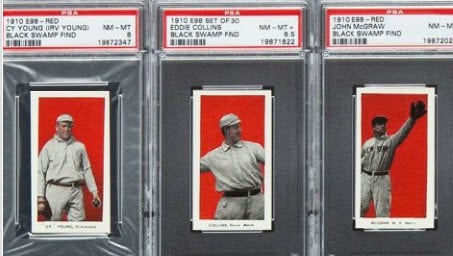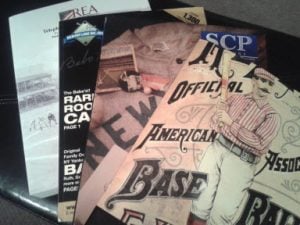If you wanted to, you could receive a catalog in your mailbox about once every ten days.? Between splashy major auctions and weekly internet-based events, sports memorabilia auction companies crank out a lot of copy.? Once a small part of the hobby, bid to own has become the primary method of transacting business for many.
Those who predicted the demise of the small auction company when eBay rocketed to the forefront about 15 years ago turned out to be wrong.?
However, it's an ultra competitive game that keeps company reps constantly on the prowl for new consignments and new ways of making a splash.? Sports Collectors Daily chatted with Ryan Friedman, the owner of Auction Report, a website that chronicles the goings on of some of those companies.
With the year winding down, was 2012 a successful one or are your companies still having a tough time with the economy?
 RF:? I think that 2012 was an exceptional year for the auction houses.? This year might have marked one for the records books with some of the most significant memorabilia and card collections in a long time hitting ?the market through auction houses such as:? The Dreier Collection (Legendary Auctions), Angelo Dundee, Oscar Robertson, Ozzie Smith, Dmitri Young Collections (SCP Auctions), Don Larsen and Bobby Knight Collection (Steiner Sports), The
RF:? I think that 2012 was an exceptional year for the auction houses.? This year might have marked one for the records books with some of the most significant memorabilia and card collections in a long time hitting ?the market through auction houses such as:? The Dreier Collection (Legendary Auctions), Angelo Dundee, Oscar Robertson, Ozzie Smith, Dmitri Young Collections (SCP Auctions), Don Larsen and Bobby Knight Collection (Steiner Sports), The  Find and Historic Rarities Auction (Memory Lane), The Black Swamp Find (Heritage Auctions), and so much more.
Find and Historic Rarities Auction (Memory Lane), The Black Swamp Find (Heritage Auctions), and so much more.
2012 also offered a huge assortment truly one of a kind high end memorabilia and cards auction off including:? Earliest known Ruth Jersey (SCP Auctions), a few T206 Wagner Cards (Goodwin & Co and Memory Lane Inc), Walter Davis Olympic Gold Medal (Grey Flannel Auctions), 1952 Topps Complete Graded Set (Mile High Card Co), and so much more from others.? It was a great year for the auction companies.
Was it harder to get consignments or harder to make money on those consignments?
RF:? This is a tough question to answer because all these auction companies are privately held and we don?t get to see their profit and loss statements, like we see with publicly traded companies, but, from talking with so many different auction houses throughout the year, consignments are always the hardest part of the auction business.? It?s not easy to get cards and memorabilia on a consistent basis.? What the public see?s with each auction is a great selection of items, but what most people don?t realize is that some of these collections and items have taken the auction companies months and years to get.? ?They spend huge amounts of money to promote, travel and research to get consignments.?? Plus, competition between the auction houses and the options consignors have between all of the different auction houses makes it even harder for each auction house to get quality consignments.
As far as how much money they make, it?s a guessing game.? But, common sense is that the auction houses are growing, many are hiring more employees, and they keep turning out more auctions, so I would say it?s safe to say they are making money.
 What are companies spending most of their time doing?? What?s most important to those who you deal with right now?
What are companies spending most of their time doing?? What?s most important to those who you deal with right now?
RF:? Number 1, 2,3 and 4 is getting consignments.? If I were put a percentage on it, I would say that 50-80% of their time is dealing with consignments and or buying of items and somewhere in the frame of 20-50% spent on production/PR/advertisement/day of the auction/post auction support and implementation.
You can?t have an auction without consignments, so I would say THE priority and will always be priority, is getting consignments, but, ?at the same time, I am seeing a larger increase of time spent on PR/Branding/Advertisement.? Being able to reach potential new clients and keep informed the current clientele are extremely important to all of the auction companies.? In fact, I would say that PR/Branding is becoming even more important to landing the larger collections because these consignors like to know that there collection is going to be properly published ?and promoted to as many people as possible.
One thing we?ve seen become commonplace over the last several years is the increasingly high quality catalogs that auction houses are producing for their major events.? They must cost a fortune to produce and ship.? Clearly, they?re important but how so, and how do they decide how much money they can spend on each catalog befor e it becomes too expensive?
e it becomes too expensive?
RF:? Everything is a numbers game.? Many of the companies that have been producing these large high quality print catalogs have been in business for a long time and their expertise in producing auctions and being able to analyze the numbers of what they believe there potential sales will be, allows them to factor in how much they can spend to produce the catalogs.?? The catalogs however are important not just in the presentation of what they are auctioning off, but also as a PR and marketing tool for the current auction future consignments, and getting new bidders.? The value of walking into a collector?s house who might have a million dollar collection and showing them the high quality auction catalog, you have produced becomes invaluable.?? These catalogs provide value to pieces (in the way they are presented) and differentiate the auction houses.
However, today, not all auction houses need to produce a catalog.? In fact, we are seeing more and more auctions that are completely web based (no print catalog produced).? We see these for a few reasons; first,?? the cost of producing a catalog isn?t justified by what is being auctioned. Secondly, some auction houses know that their clients just don?t need a printed catalog to lug around, they know that 98% of bids are coming in through the web sites where all of the items are pictured (with more images than the print catalogs) and full descriptions.? With today?s technology and hardware that is available (Tablets, Notebooks, Cell Phones) accessing the auction and being able to have all the information you need to bid, makes the need for a catalog less important.
 How do auction companies build their mailing list and is it the most important part of their business?
How do auction companies build their mailing list and is it the most important part of their business?
RF:? There are numerous ways that the auction companies build their mailing lists, most commonly through various advertisement (on-line and print), conventions, and PR/Social Media.?? I think it?s an important part of their business, and has to be managed well.? They also have to engage their existing clients all the time as well, bringing top notch customer service to existing clients (thus keeping them on your mailing list) is equally as important as bringing in new clients.
There was at least one new entry into the auction game this year and another that changed hands.? Is there still room in what?s become a very crowded field?
RF:? Obviously for Auction Report, the more auction houses the better. But, in my opinion I believe that there is plenty of room for more.?? The auction business and or the auction format of buying and selling is the most popular way to do business, period.? This being said, it is only natural to see more ?auction companies? pop up.? Or, you see companies that have been in business for years who have been simply buying and selling items directly to their clients who are switching over and now offering items in an auction format.? ?A lot of the auction houses have a niche of what they deal in and there are plenty of areas of collectible and material to support more auction companies.
There is also the eBay cross over companies, and what I mean by this is that these are companies that have primarily sold through eBay style auctions who now find it better to do their own auctions with their own auction software in house.? ?Also, there are companies that do eBay only auctions, but, are now marketing and promoting their auctions outside of the eBay community, so they may seem new, but they are just reaching a new collector base outside of the eBay world.
Lastly, I do believe that you might see some of the larger auction houses merge with or buy some of the smaller auction houses in the next year or two.?? Just like you see with massive companies like A pple, Google, Microsoft, GE, it becomes easier to grow the business, acquire top talent and expanding your clientele base by buying up smaller companies.? We may see some of this in the near future or in a down market turn.
pple, Google, Microsoft, GE, it becomes easier to grow the business, acquire top talent and expanding your clientele base by buying up smaller companies.? We may see some of this in the near future or in a down market turn.
What?s the one thing buyers wish auction companies would change about the way they conduct business?
RF:? I wouldn?t say buyers want specific things changed, but rather, they want to see the auction houses always making improvements where they can.? Having better quality/more images of the auction items, accurate and detailed descriptions of the items, quality customer service are all areas where I believe each of the auction houses are always striving to do the best they can. There is always room for improvement.?? If there are specific changes buyer?s want, I strongly suggest they e-mail us ([email?protected]) as we will be happy to pass along suggestions to any specific auction house or they can contact the auction house direct with any suggestions.? The auction houses are always open to hearing from their clients.
Is there optimism about 2013?
RF:? Yes!? I think we are going to see a continuation of great consignments, memorabilia and card collections being offered in 2013.? The clientele base for sports memorabilia and cards is growing more and more main stream and even becoming more of an investment tool as well which attract a new type of collector.? I truly believe that both buying and selling via auction in 2013 may be another record setting year.
Related posts:
- Auction Insider: Bidding Strategy
- Auction Insider: Busy Season for Bidding
- Auction Insider: Who Should You Do Business With?
- Biggest Challenges in the Auction Business
- Auction Insider: Looking Ahead
Source: http://www.sportscollectorsdaily.com/auction-insider-bidding-for-business/
new madrid fault rihanna and chris brown affirmative action helicon zac efron and taylor swift real housewives of orange county bloom energy
No comments:
Post a Comment